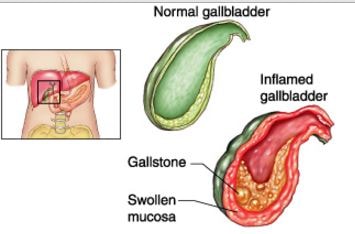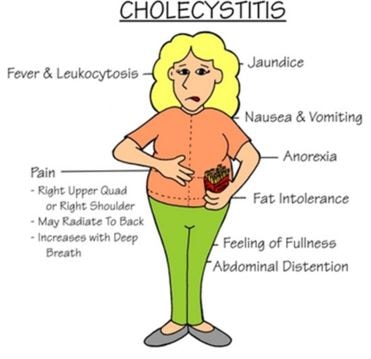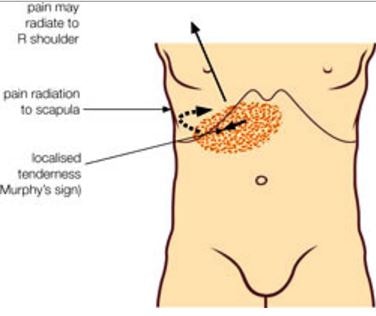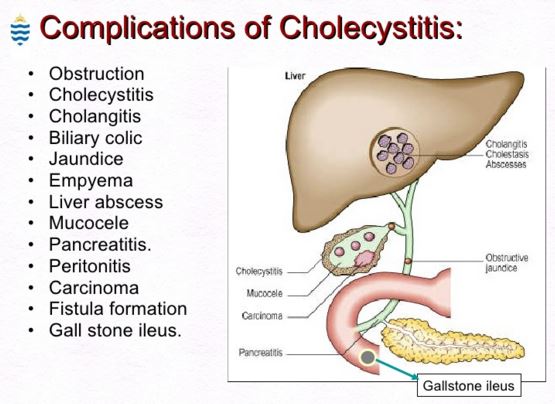What is Acalculous Cholecystitis?
Cholecystitis refers to a problem that involves gallbladder inflammation. Gallbladder is that small organ of the body located near the liver, which takes charge in food digestion. This problem occurs with some common reasons where gallstones formation causes a blockage of the cystic ducts.

Such a blockage results to the accumulation of the bile fluid, increasing the pressure developed inside the gallbladder, leading to the swelling and feeling of pain particularly in the right upper abdominal quadrant, and may end up with an infection.
Acalculous cholecystitis is considered a severe form of an illness that arise as a complication from other underlying medical and surgical health conditions of an individual. It has also been related with increased incidence of some perforation and gangrene formation in wounds as compared to a calculous disease.
Medical practitioners can also observe acalculous cholecystitis among patients who are diagnosed to have the human immunodeficiency virus infection (HIV infection), and for those patients who are receiving total parenteral nutrition therapy for more than 3 months period.
Acute acalculous cholecystitis (AAC) is the rare form of this problem which is usually noted among critically ill patients admitted in the intensive care units of hospitals for close monitoring.
There are no gallstones formation which are involved, but rather it came about as a form of complication from another disease condition and caused by swelling, such as those positive with an HIV infection or those with diabetes problem.
Long-term cholecystitis (ACC) is also known as the chronic form of cholecystitis which can occur when there is continuous swelling of the gallbladder, leading to the thickening and the hardening of gallbladder walls.
Causes of Acalculous Cholecystitis
An inflammation in the gallbladder is the main reason for cholecystitis to occur. The inflammation is due to the formation of gallstones. Other reasons for the inflammation could also be an existing blockage of a growing tumor or when a bile duct scarring can happen due to other problems.
It is taken into some consideration that most patients found to develop gallstones do not present symptoms of cholecystitis and will not have some chances to have the cholecystitis problem.
Although according to some studies, cholecystitis formation is triggered by the blockage of gallstones in the cystic duct, since the bile fluid cannot pass out of the gallbladder going into a normal route to the small intestines in relation to the digestion process. In this case, gallstones are then formed and sticking into the cystic duct causing the problem of cholecystitis as a whole.
Acalculous cholecystitis takes into account approximately 5% to 10% of all those cases of patients who have acute cholecystitis. There are a number of similar risk factors that predisposes a person to have cholecystitis and gallstones formation and these are as follows:
- Sex where males predominate in acalculous cholecystitis, while females predominate in the calculous cholecystitis type
- Age wherein the problem occurs at any age, although more observed as the person increases in age
- Obesity
- Rapid weight loss
- Pregnancy
- Taking of some types of oral contraceptives
- Female sex with multiple partners
- Diabetes mellitus
- May occur in all races
Signs and Symptoms
Individuals who have gallstones are not always at all times found to manifest the symptoms of cholecystitis. The characteristic symptoms of cholecystitis are the following:
- Pain in the right upper abdominal quadrant is referring to a biliary colic which can be episodic only
- Nausea and vomiting usually follows after the biliary colic of the person
- Fever is commonly noted during the physical examination
- Increased white blood cell count as shown in laboratory exams


Medical Treatment
Once the diagnosis of acalculous cholecystitis has been confirmed, immediate medical intervention has to be done to prevent the possibility of rapid deterioration of an inflamed gallbladder as well as the tendency of the perforation of the gallbladder.
Nonsurgical approach:
- Prescription of antibiotics in the presence of an infection
- Percutaneous cholecystostomy as an alternative to a surgical treatment which is the insertion of a tube into the gallbladder in the form of a percutaneous drainage catheter
- Endoscopic gallbladder stent replacement as palliative treatment for those who are at high risk to undergo surgery especially in cases of an end stage liver disease
Surgical approach:
- Open or laparoscopic cholecystectomy which involves the removal of the gallbladder
Complications

References:
http://emedicine.medscape.com/article/187645-overview
Acalculous cholecystitis PATHOGENESIS at http://www.uptodate.com/contents/acalculous-cholecystitis
How is cholecystitis diagnosed? How is it treated? at http://www.webmd.com/digestive-disorders/tc/cholecystitis-overview
Greenberger N.J., Paumgartner G (2012). Chapter 311. Diseases of the Gallbladder and Bile Ducts. In Longo D.L., Fauci A.S., Kasper D.L., Hauser S.L., Jameson J, Loscalzo J (Eds), ‘Harrison’s Principles of Internal Medicine, 18e.Retrieved November 08, 2014.
Strasberg, SM (26 June 2008). “Clinical practice. Acute calculous cholecystitis”. The New England Journal of Medicine 358 (26): 2804–11.
Velanovich V (2000). “Laparoscopic vs open surgery: A preliminary comparison of quality-of-life outcomes”. Surgical endoscopy 14 (1): 16–21.

Thank u very very much for making me understand my ill health situation. You know when l read trough the publication it was like l was before a doctor. I had an acute stomach pain, and rushed to the hospital. I was treated, the pain stopped. I was diagnosed of ACALCULOUS CHOLECYSTITIS. A surgery was recommended later and l asked myself why, no medication. I now know what is happening to me, of course know l am okay but please advise me by answering the following questions for me.
1.Which one is best, Medication or straight to Surgery
2. Is it a major surgery. 3. How long 4. What should l eat and not.
May JEHOVAH GOD BLESS you and give you more wisdom. Hoping to hear from you. Quarshie. Thnx
Thank you very very much for the insight, l was diagnosed of ACALCULOUS CHOLECYSTITIS. I now know what is happening to me. The doctor recommended surgery after treating me and discharged. But please let me know what to do. Though the pains has stopped occasionally l feel tense in my stomach.
1. Should l go for Medication or Straight to surgery.
2. Is it a major surgery.
3. How long
Hoping to hear from you. JEHOVAH GOD bless you and give you more wisdom. THANKS. Counting very much on you.